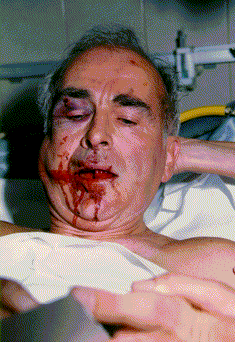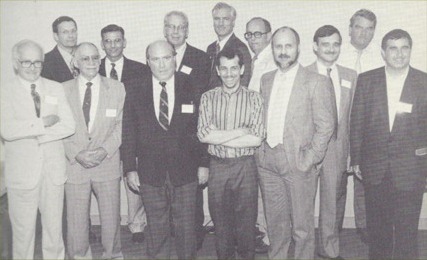Holocaust Hate Speech
Editorial
“But what was strange was that although Goldstein was hated and despised by everybody, although every day, and a thousand times a day, on platforms, on the telescreen, in newspapers, in books, his theories were refuted, smashed, ridiculed, held up to the general gaze for the pitiful rubbish that they were—in spite of all this, his influence never seemed to grow less.” —George Orwell, 1984
Heinrich Heine, a Nineteenth-Century German poet and essayist, is most remembered for his comment, “Where books are burned, in the end people will be burned too.” Today his quote is prominently displayed in the Yad Vashem Holocaust museum in Jerusalem as well as in the United States Holocaust Memorial Museum (USHMM).[1] In its contemporary context, Heine’s quote is understood to mean that an ideology that refuses to tolerate minority opinion will ultimately become a mortal threat to minorities themselves. It is often associated with incidents in Germany during National Socialist rule and is typically viewed as a prophetic warning.
In Twenty-First-Century America, it seems quite misguided to be overly concerned about Nazi book burnings or Nazi human burnings for that matter. Heine, who died in 1856, was not actually concerned about Nazis but rather the immolation of ideas – of diversity of thought. Today actual book burnings are mostly symbolic. In centuries past, the burning of a book might indeed literally “holocaust” an idea, although all copies of certain books most definitely have been confiscated and macerated (pulped) in—that’s right—Germany. In the post-World War-II era, when books can easily and affordably be printed and reprinted, book burnings and censorship rarely have the impact desired.[2] Today, thanks to the Internet, traditional book burnings are generally superfluous.
Contemporary censors need not strike a match, or carry the flamethrowers of Bradbury’s Fahrenheit 451.[3] The removal from sale from on-line booksellers accomplishes the nefarious deed without the mess and air pollution of a hastily constructed bonfire. In fact, book burnings are no longer conducted in town squares but rather through well-orchestrated campaigns to remove undesirable titles from the virtual shelves of on-line booksellers, along with such tactics as denying direct sellers credit-card facilities for the use of their customers.[4]
Recent campaigns to throttle the free exchange of ideas come only months after the outrage expressed by hundreds of thousands following the 7 January 2015 massacre at the offices of the French leftist newspaper Charlie Hebdo. More than 40 world leaders showed up to demonstrate their support presumably for free speech and the free exchange of ideas. Thousands created signs emblazoned with the slogan “Je suis Charlie” (“I am Charlie”).[5] However, many of the leaders who participated in the march were leaders of countries that openly prosecute authors whose ideas are inconvenient for those in power. Specifically, the so-called “denial,” or revision, of the history of the Holocaust is illegal in 14 European nations including France and Germany.[6]

Source: http://ihr.org/books/ztn.html
While German Prime Minister Angela Merkel marched for Charlie Hebdo it is important to recall that on 15 June 1995 a German judge ruled that all copies of the book Grundlagen zur Zeitgeschichte (Foundations of Modern History) be burned. In the run-up to this order, a raid was conducted against the German publisher of this title and all copies were confiscated by the authorities. The book’s editor, a German physicist named Germar Rudolf, was ordered to be arrested.[7] At the time, Grundlagen was the most up-to-date academic book dealing with forensic evidence of the murder of Jews by the National Socialist regime.
Years earlier a terror campaign resulted in a devastating arson attack against the offices of the Institute of Historical Review. Damage from this firebombing, which consumed many thousands of books, was estimated at $400,000. Two days after the attack, then-leader of the Jewish Defense League, Irv Rubin, showed up at the site and declared that he “wholeheartedly applauds the recent devastation.”[8]
The hate against Holocaust revisionists is spread not only through official governmental legislation and violent campaigns of terror, but is embedded in the language of recondite college professors. In her Denying the Holocaust, Deborah Lipstadt used a language of hate when describing Holocaust revisionists, “Today the bacillus carried by these rats threatens to ‘kill’ those who already died at the hands of the Nazis for a second time by destroying the world’s memory of them.”[9]

Source: CODOH
Hatred often does result in violence. In France, where so many were quick to declare Je suis Charlie, Europe’s most prominent Holocaust revisionist scholar, Professor Robert Faurisson, sustained no less than ten physical assaults between 1978 and 1993. During one attack in 1989, assailants sprayed a stinging gas into his face temporarily blinding him. Three men then pummeled him to the ground where they repeatedly kicked him in the face and chest. At the time, Faurisson was 60 years old. The crime was ultimately attributed to “young Jewish activists from Paris.”[10] Dr. Faurisson, for reasons that his opponents are eager to misrepresent, persists in his efforts to improve historical understanding.
There certainly is hate speech regarding the Holocaust circulating today. The folks at the tax-funded USHMM (United States Holocaust Memorial Museum) would have you believe that revisionists (or “deniers” as they like to defame them) are the exponents of such sentiments. But the revisionists make their case in books and in articles. Their arguments don’t call for the elimination of any people, nor of books. Neither are the revisionists in positions of authority from which they could prosecute—or persecute—even those who charge quite the most-unbelievable crimes against the German people.
The language of hate directed against those who question even the smallest of details regarding the Holocaust should be a warning to all—and it is. In Orwell’s prophetic 1984, the totalitarian government of Big Brother broadcast “2-Minute Hates” in which the general masses are incited to indulge in paroxysms of hatred of its purported enemies. Orwell describes the effect:[11]
“A hideous ecstasy of fear and vindictiveness, a desire to kill, to torture, to smash faces in with a sledge hammer, seemed to flow through the whole group of people like an electric current, turning one even against one’s will into a grimacing, screaming lunatic.”

Speakers from the Twelfth IHR Conference (1994). From left to right. Robert Faurisson, John Ball, Russ Granata, Carlo Mattogno, Ernst Zündel, Friedrich Berg, Greg Raven, David Cole, Robert Countess, Tom Marcellus, Mark Weber, David Irving, and Jürgen Graf.
Source: The Journal of Historical Review, Vol. 14, No. 6, Nov/Dec 1994.
A quick look at the entry for “Holocaust Denial” on the popular on-line encyclopedia Wikipedia reveals the prominent placement of a photo of several Ku Klux Klansmen with placards denouncing the Holocaust. The simplistic messages include, “There was no Jewish Holocaust” and “Holocaust Gigantic Zionist Hoax.” While the origin and the context of the photo are uncertain, its purpose on this page is clear – Holocaust deniers are meant to be viewed as members of extremist hate groups.[12] For balance, one might expect to see a photo of speakers at a revisionist conference. But there is none. The photo of the Klansmen is not displayed to accurately convey any truth, but rather to stir hatred.
Images such as this and many others employed by supporters of the regnant wartime propaganda Holocaust meme have a very emotional effect. They are used to stir people into a frenzy. Soon such indiscriminate readers ask questions like, “How can such ideas be allowed to be sold?” “How can the Holocaust be debated?” “Why are deniers not in prison?” “Why aren’t their offices burned?” “Why are they not beaten?” “Why, like the disease-bearing rats they are, are they not exterminated?” Such is the state of Holocaust hate speech today.
The ultimate irony is that Orwell’s “grimacing screaming lunatics” come from the ranks of those who profess to uphold the “official” Holocaust story. If toleration is indeed the moral of the story, these champions of orthodoxy either fail to comprehend it, or they openly choose to deny it.
Notes:
| [1] | Online: http://en.wikipedia.org/wiki/Heinrich_Heine |
| [2] | Banned books have become an industry in and of themselves. In the United States, the week of September 27th is celebrated as “Banned Books Week.” Several organizations and bookstores participate and urge people and especially students to read banned books. For for example: http://www.ala.org/bbooks/bannedbooksweek |
| [3] | Ray Bradbury’s 1953 dystopian novel depicted a future world in which firemen were responsible for burning outlawed books. |
| [4] | Caitlin Dewey, “Amazon, PayPal and Spotify inadvertently fund white supremacists. Here’s how.” The Washington Post, 17 March 2015. Online: http://www.washingtonpost.com/news/the-intersect/wp/2015/03/17/amazon-paypal-and-spotify-inadvertently-fund-white-supremacists-heres-how/ |
| [5] | Online: http://www.slate.com/blogs/the_slatest/2015/01/11/ je_suis_charlie_more_than_40_world_leaders_head_up_massive_paris_march.html |
| [6] | Online: http://en.wikipedia.org/wiki/Laws_against_Holocaust_denial |
| [7] | Richard Widmann, “Problems Warned about in Fahrenheit 451 Threaten Today’s World,” in Readings on Fahrenheit 451 (San Diego: Greenhaven Press, 2000), p .153. Grundlagen Zur Zeitgeschichte is published in English translation under the title Dissecting the Holocaust. |
| [8] | Mark Weber, The Zionist Terror Network (Newport Beach, Institute for Historical Review, 1993), pp. 10-11. |
| [9] | Deborah Lipstadt, Denying the Holocaust (New York, Plume, 1994), p. xvii. |
| [10] | Robert Faurisson, “Jewish Militants: Fifteen Years, and More, of Terrorism in France,” Journal of Historical Review, vol. 16, no. 2 (March/April 1996), pp. 2-13; online: https://codoh.com/library/document/jewish-militants-fifteen-years-and-more-of/ |
| [11] | George Orwell, Nineteen Eighty-Four (New York, Harcourt , Brace and Company, 1949), p. 15-16. |
| [12] | Over the course of the past 30 years, I have met most of the leading figures in Holocaust revisionism. None of these people was in any way affiliated with the Ku Klux Klan. It would arguably be fairer to post a photo of the Klan under the Wikipedia entry for “Democratic Party” or “Republican Party.” |
Bibliographic information about this document: Inconvenient History, 2015, vol. 7, no. 2
Other contributors to this document: n/a
Editor’s comments: n/a
